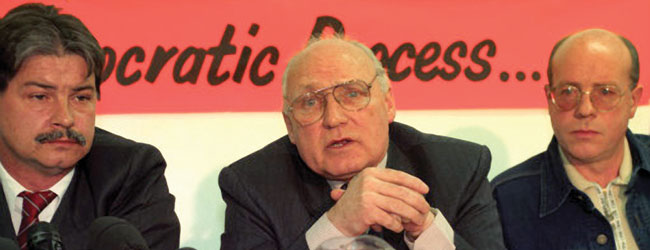30 September 2011
LEADER OF THE MODERN-DAY ULSTER VOLUNTEER FORCE PASSES AWAY
Gusty Spence dies
BY PEADAR WHELAN
IN A LETTER written in Long Kesh in 1981, former UVF leader Gusty Spence, who died on Sunday 25th September aged 78, reflected on his reasons for helping re-form the UVF in the mid-1960s.
“I can’t possibly say that I knew the ins and outs of the political machinations in the background because I didn’t. I was approached to join the UVF. The way the story was put to me was that there was incipient rebellion and I had taken an oath to Her Majesty to defend her - it seems grandiose - against her enemies foreign and domestic. I saw my service in the UVF as a continuation of my British Army service.” This extract from the letter written by the former UVF leader gives an insight into the thinking of loyalist leaders like Spence, who was manipulated by unionist politicians into re-forming the UVF.
When he died on Sunday 25th September 2011, Spence was seen as a completely different character.
His years in prison seemed to have politicised him to the extent that this earlier naïve view of unionist politicians and their exploitation of the unionist working class was replaced by a more worldly approach to politics.
In line with his latter thinking, Spence encouraged loyalists to engage more with politics and be more representative of the loyalist working class and their interests.
Spence was born on June 28th 1933 in the Lower Shankill area of west Belfast and joined the British Army’s Royal Ulster Rifles in 1957.
In 1965, he joined the Shankill unit of the UVF as its commanding officer, just months before Catholic barman Peter Ward was shot dead outside the Malvern Arms pub.
Spence and two others were found guilty of the Ward killing and sentenced to life imprisonment in October 1966.
Before his release from prison, in 1984, Spence resigned from the UVF and advocated politics and non-violence.
He emerged into the limelight when, in October 1994, the Combined Loyalist Military Command (the leaderships of the UVF, Red Hand Commando and the UDA) announced their ceasefires.
While he was held up as an advocate of political leadership over the years, Spence was very much a private person, largely retired from frontline politics.
Despite this, most of those within the leadership of the UVF-aligned Progressive Unionist Party cite Spence as their mentor.
He was driven out of the Lower Shankill during the UVF/UDA feud in 2000 after his home was attacked and he receded more and more into the background. His death came after a long illness.
Commenting on Spence’s death, Sinn Féin MLA Gerry Kelly said:
“Gusty Spence was a well-known and influential figure with the UVF and many nationalists will remember him as central to the sectarianism that gave birth to the modern loyalist paramilitary.
“However, he did dedicate himself to peace and reconciliation for much of his later life so he will also be remembered as a major influence in drawing loyalism away from sectarian strife.
“Gusty Spence played a key role within loyalism in bringing the UVF and Red Hand Commando into the Peace Process and announcing their ceasefires in 1994. This valuable contribution allowed the Peace Process to develop further.”
Follow us on Facebook
An Phoblacht on Twitter
Uncomfortable Conversations

An initiative for dialogue
for reconciliation
— — — — — — —
Contributions from key figures in the churches, academia and wider civic society as well as senior republican figures





